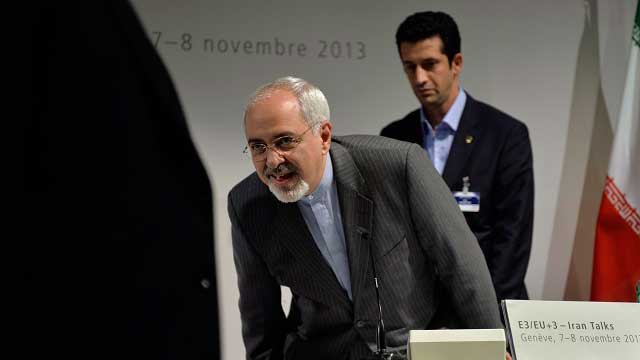SUMMARY
This is AI generated summarization, which may have errors. For context, always refer to the full article.

TEHRAN, Iran – Iran, backed by Russia on Tuesday, November 12, blamed friction among Western powers for the failure of Geneva talks that came tantalizingly close to a landmark deal on its nuclear program.
Foreign Minister Mohammad Javad Zarif dismissed claims by US Secretary of State John Kerry that Iran had balked at the deal on offer from the six powers in last week’s talks.
He said it was French objections to the draft thrashed out by Tehran and Washington that had scuppered an agreement, echoing criticism of French Foreign Minister Laurent Fabius in the Iranian media.
“Mr Secretary, was it Iran that gutted over half of US draft Thursday night? And publicly commented against it Friday morning?” Zarif asked on Twitter.
Zarif spent nearly seven hours with Kerry in Geneva as both sides worked on the draft text of an agreement.
Fabius joined the talks on Friday, November 8, and immediately cast doubt on a deal. The following day he was even less upbeat.
“There are some points on which we are not satisfied,” Fabius told France Inter radio on Saturday morning, November 9, citing concerns about the heavy water reactor Iran is building at Arak and its stockpiles of 20 percent enriched uranium.
Western governments fear that the 20 percent level marks a key stepping stone towards the 90 percent plus level required for a nuclear warhead.
The Arak reactor is also of concern because, if completed, it would produce plutonium as a by-product, potentially offering another route to an atomic weapon.
Kerry denied that differences between the Western powers had led to the talks between Iran and the P5+1 – Britain, China, France, Russia and the United States, plus Germany – ending inconclusively early on Sunday, November 10.
“The P5+1 was unified on Saturday when we presented our proposal to the Iranians… But Iran couldn’t take it,” Kerry said in Abu Dhabi on Monday, November 11.
Russia backed Iran, however, saying it was not to blame for the failure to reach agreement.
“The draft joint document suited the Iranian side. But since decisions at negotiations are taken by consensus, it was not possible to make a final deal,” a foreign ministry source said in comments carried by Russian news agencies.
“And this was not the fault of the Iranians,” the source said.
“Such an interpretation simplifies to an extreme and even distorts what happened in Geneva.”
Iran, US try to ease Gulf Arab fears
Diplomats insist that they remain close to a deal, however, and the talks are to resume in Geneva on November 20 at the lower level of political directors.
Late Monday, Zarif cautioned Kerry that “putting a spin on the reality… does not help generate trust in the negotiation process.”
He suggested Kerry’s remarks in the United Arab Emirates capital were intended to allay the concerns of the “hosting country,” referring to fears among Gulf Arab states of a rapprochement between Washington and their regional rival.
Zarif tried to ease Gulf Arab concerns, insisting that the negotiations were focused solely on the nuclear issue, and not on diplomatic relations between Tehran and Washington, which have been broken for more than three decades.
He said that Iranian envoys had been instructed to “garner the support of our brothers in the Persian Gulf” for a nuclear deal, which he said was “still within reach.”
Israel’s newly reappointed Foreign Minister Avigdor Lieberman, meanwhile, pledged to work to mend relations with Washington after its own, very public, spat with its US ally over the nuclear talks.
“Regarding our recent differences with the United States, it’s now time to calm things down,” Lieberman said at a ceremony marking his return to the foreign ministry after being cleared of corruption charges.
He said he had met US ambassador Dan Shapiro in his “first work meeting” on Tuesday morning, and stressed that “relations with the US are crucial.”
Israeli Prime Minister Benjamin Netanyahu had furiously denounced the deal under discussion in Geneva, describing it as “dangerous” and the “deal of the century” for Iran. – Rappler.com
Add a comment
How does this make you feel?
There are no comments yet. Add your comment to start the conversation.